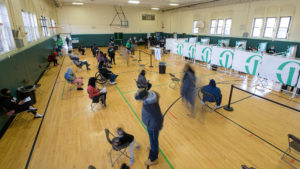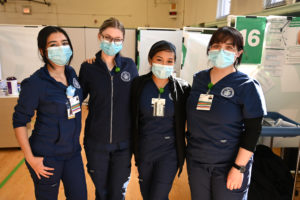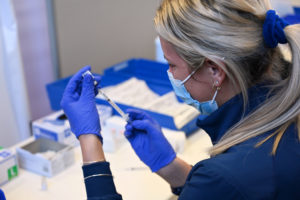By: Darnell Shields, Executive Director of Austin Coming Together
Originally published in 4/21/21 issues of Austin Weekly News and Wednesday Journal newspapers

Time-lapse photo from the temporary vaccine clinic at Catalyst Circle Rock. (Photo courtesy of Dominican University)
Austin is Chicago’s largest community area with nearly 100,000 people but it only has two grocery stores. Lincoln Park, on the other hand, has ten grocery stores for their 60,000 residents.
Unfortunately, that is just one example. Austin residents also struggle to find the same quality education, living-wage jobs, and safety that is readily available in other areas.
When it comes to equity—defined as fair treatment, access, opportunity and advancement for all people—it is simply not present in Austin.
Why? Years of disinvestment and lack of support for essential services and infrastructure.
With high unemployment, low life expectancy, and limited to no access to certain resources, families here face racial injustice on several levels.
When a community lacks basic infrastructure, it becomes more vulnerable to the effects of a disaster being detrimental in the long-term, especially a disaster of the caliber of COVID-19.
The events of 2020 exposed broken systems, oppressive policies, and layers of deeply rooted injustice. But it also showed just how strong the Austin community is.
Through riots, unrest, and much heartbreak, Austin remained resilient. And we continue to push through seemingly insurmountable challenges because we are standing together to face them.
Austin is my home, so seeing the creative and often heroic ways neighbors are helping each other fuels my passion for this work.
Austin Coming Together (ACT), alongside other stakeholders, has been dedicated to connecting Austin to the opportunities it needs since our inception in 2010. We leverage our network and experience in order to mobilize resource distribution and increase equitable access.

A small group of Dominican University nursing students volunteered to assist at the clinic at Catalyst Circle Rock. (Photo courtesy of Dominican University)
Last year, ACT joined Mayor Lightfoot’s Racial Equity Rapid Response Team (RERRT) and its collective effort to address racial disparities in Black and Brown communities. In an attempt to flatten the COVID-19 mortality curve, the RERRT partnered with local groups to launch an education and engagement strategy, generate and distribute PPE supplies, and set up testing sites including five in Austin. Through this, the foundation for future work to tackle long standing and systemic inequities was laid. Being part of this effort has allowed ACT to magnify the needs of Austin and participate in the creation of community-centric strategies.
West Side United takes a similar approach seeking out community involvement in designing solutions. The group was formed through input from local residents and leaders who wanted to see tangible impact in metrics like economic vitality, housing cost burden, and violent crime rates. As a collaborative of health care institutions, residents, educators, non-profits, businesses, government agencies and faith-based entities, West Side United’s ‘Live Healthy West Side’ framework brings health education, training, and services to vulnerable populations through community engagement. These and other efforts are helping West Side neighborhoods grow into stronger, healthier and more vibrant places to live.
Far beyond health care, there are many social factors that determine a family’s chances of thriving. That is why West Side United partners like Rush University Medical Center have expanded their mission from beyond providing expert health care to improving the quality of life for people in its diverse neighboring communities, like Austin.
“When you have a strong economic foundation, the health outcomes are better,” said Darlene Hightower, Vice President of Community Health Equity at Rush.
In addition to critical support of COVID-19 response, Rush has improved mental health access in schools, and served 10,000 families on the west side with food within the past year. Recently, Rush was called upon to assist with a Protect Chicago Plus initiative and to help create, set up and run two temporary vaccine clinics in Austin in a matter of a few short weeks.
I have never been more proud of my colleagues at the Austin clinic. They’ve shown we will step in and do more with no hesitation.” said Darlene Hightower, Vice President of Community Health Equity at Rush.
Although it is more common now than in years past, this level of coordination and partnership must become the standard going forward.
My faith in a beautiful future for my community has not wavered. We are on the right path, but it will take rethinking and retooling how we invest in communities to really see places like Austin thrive.
Read more about ACT’s work in Austin:
- ACT’s COVID-19 recovery efforts
- ‘An unwavering commitment’ by Darnell Shields, ACT Executive Director
- Distanced and disconnected: How COVID-19 has widened the digital divide and how ACT is working to address it
- Austin’s quality-of-life plan called ‘Austin Forward. Together.’ (AFT)
- 2020 Highlights from the Austin Forward. Together plan
- The ASPIRE Initiative set of development projects near Madison and Central in Austin


